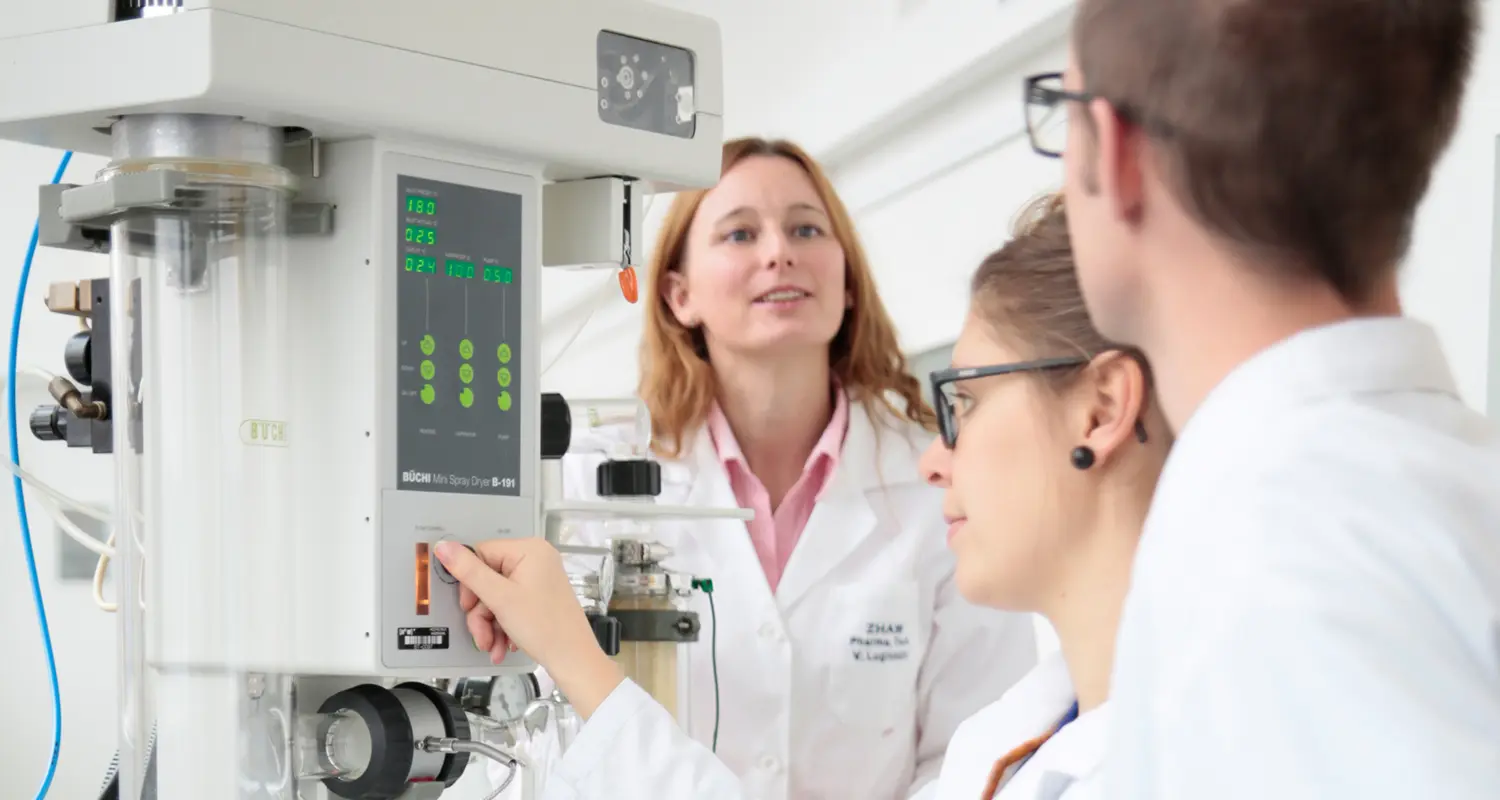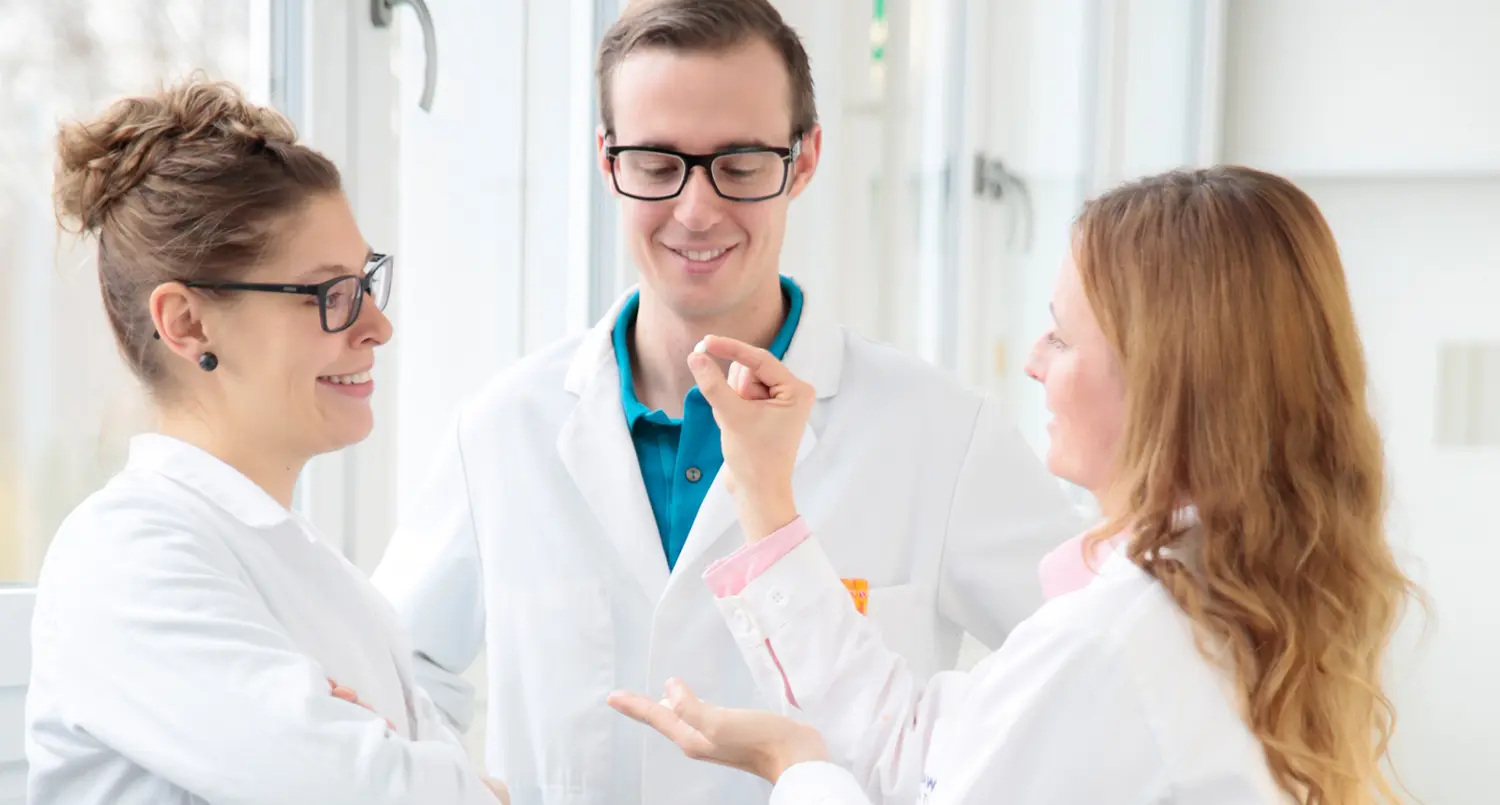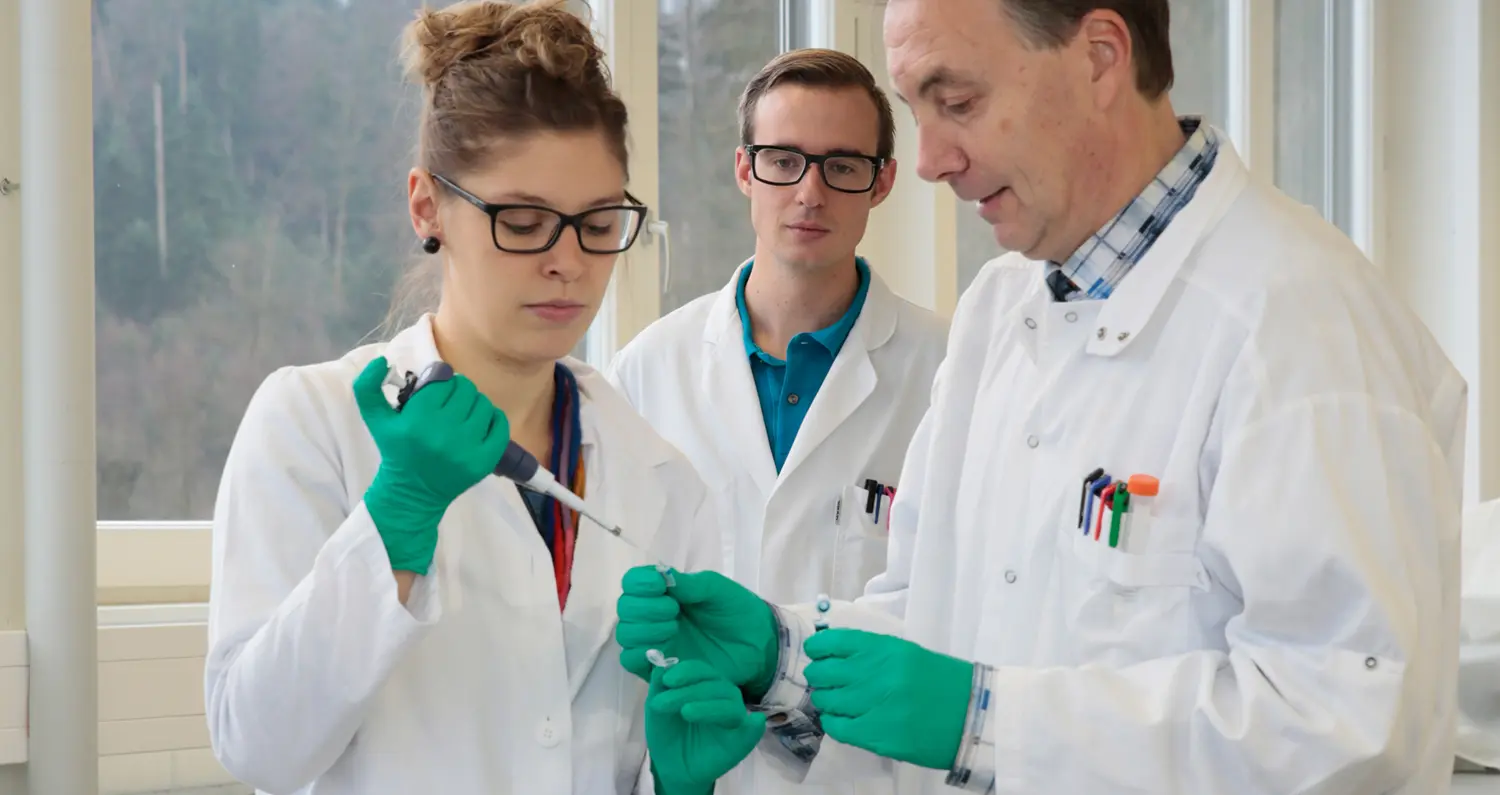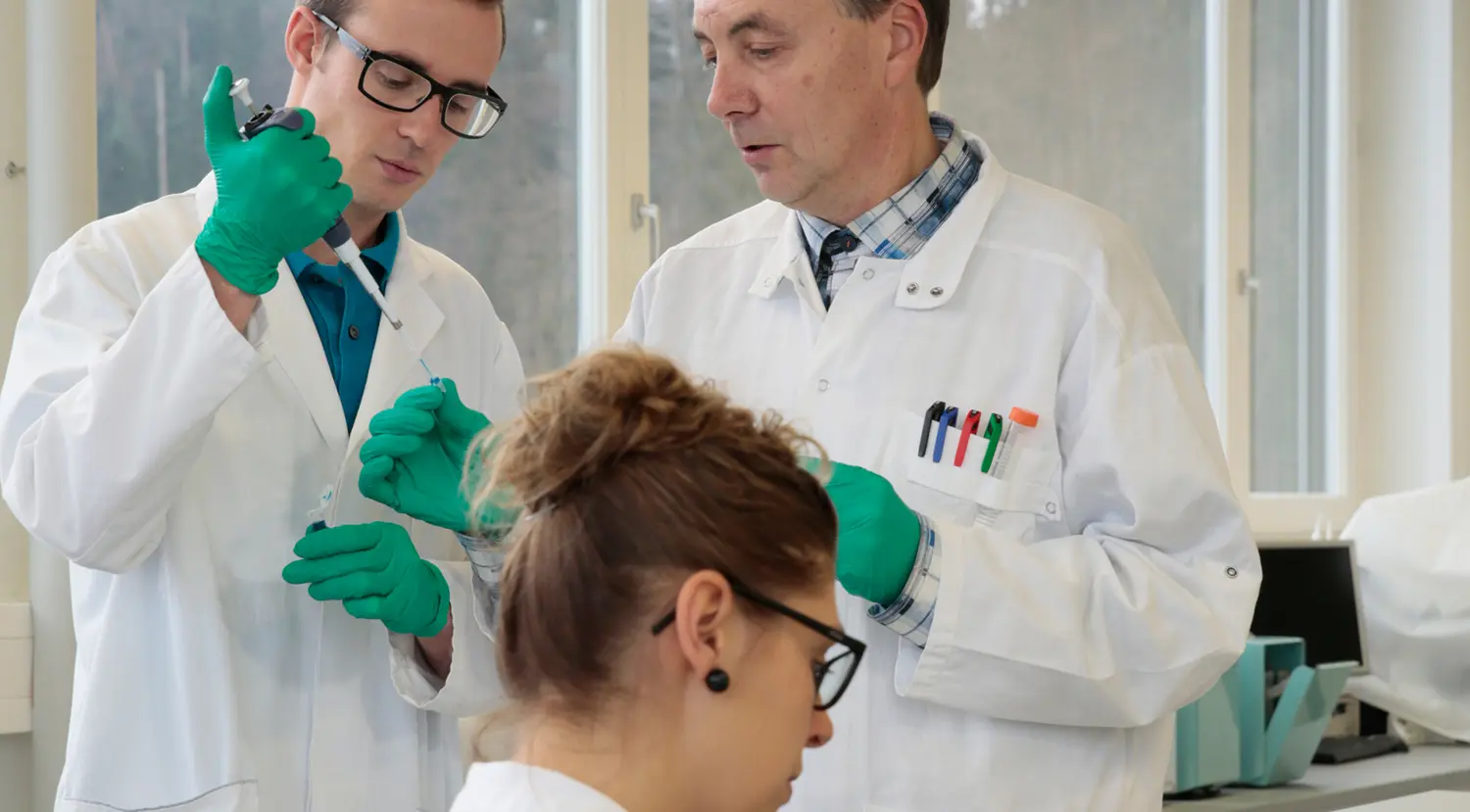Master's Thesis
Pharmaceutical Biotechnology
Die Master Thesis ist der wissenschaftliche Kern Ihres Studiums: Ihre Fachkurse wählen Sie bereits im Hinblick auf das Thema Ihrer Thesis, welches Sie vor Studienbeginn bestimmen. Basierend auf den theoretischen Grundlagen des Studiums beantworten Sie eine konkrete Fragestellung in Ihrem Forschungsgebiet. Sie erarbeiten Lösungen mit Relevanz für Forschung, Wirtschaft und Gesellschaft, meist in Zusammenarbeit mit nationalen oder internationalen Partnern. Entsprechend arbeiten Sie in einer Forschungsgruppe am Institut für Biotechnologie in Wädenswil oder extern bei einem Industrie- oder Forschungspartner. Mit der Thesis demonstrieren Sie nicht nur Ihr Wissen und Ihre Kompetenz, sondern auch die Fähigkeit, sich erfolgreich in einer Forschungsgruppe zu integrieren und Ihre spezifischen Kenntnisse in Ihrem Wissenschaftsgebiet zu erweitern.
Arbeitsweise
Für die Master Thesis konzentrieren Sie sich auf einen bestimmten Bereich der pharmazeutischen Biotechnologie im Rahmen einer Forschungsgruppe. Dabei planen und arbeiten Sie weitgehend selbständig in Absprache mit Ihrer Betreuungsperson und allfälligen externen Forschungs- oder Industriepartnern. So vertiefen Sie nicht nur Ihre wissenschaftlichen und technischen Kompetenzen, sondern eignen sich auch Kenntnisse in Projektmanagement an. Ein Forschungsprojekt langfristig und erfolgreich zu verfolgen, erfordert und schult Ihre Flexibilität, beispielsweise, wenn wissenschaftliche Hypothesen überdacht oder Versuchsanordnungen angepasst werden müssen. Für die Thesis ist ein Zeitraum von acht Monaten vorgesehen, den Sie individuell während Ihrer Gesamtstudienzeit einplanen können.
Themen Master Thesis
Das Thema Ihrer Master Thesis wählen Sie in einer der folgenden Forschungsgruppen:
Bioprocess Technology
- Bioprocess development for whole-cell pharmaceutical products (vaccines, recombinant drug delivery platforms)
- Development of novel assays and analysis concepts for at-line and on-line monitoring of virus production processes
- Recombinant targeting entities for prodrug cancer treatment. Bioassay-guided optimization.
- Cell-based, high-throughput diagnostic platforms for parasitic diseases
Contact: Dr. Lukas Neutsch
Bioanalytics
- Structure-activity relationship and analysis of enzymatic mechanism in bacteriophage tailspike proteins (includes cloning, expression in bacterial expression system, protein purification, activity assays, diverse bioanalytics)
- Development of novel assays and bioanalytical tools for (quantitative) bacteriophage tailspike protein characterization
- Bacteriophage Engineering, tailspike protein mutagenesis
- Stability assessment of marketed, monoclonal therapeutic antibodies
- Expression, purification and bioanalytics of therapeutic monoclonal antibodies and fragments thereof
- Episomal expression, purification and bioanalytics of human Fc Gamma Receptors and neonatal Receptor FcRn (includes mammalian expression systems)
Contact: Prof. Dr. Sabina Gerber
Pharmaceutical Technology
- Surface functionalization of extracellular vesicles (EVs) for target-specific delivery of therapeutic mRNA molecules to pediatric high grade glioma cells
- Establishing of novel pharmaceutical formulations for bacteriophages / phage proteins
- Characterization of primary fibroblasts from fibrosis patients to identify novel therapeutic targets
- Establishing heterotypic 3D tumor cell culture models to study the efficacy of novel, macrophage-based immunotherapies
- Development of plant based biopolymers for the use of pharmaceutical drug delivery systems.
Contact: Prof. Dr. Steffi Lehmann
Contact: Dr. Andrea Baier
Food Microbiology
- Isolation, characterization, and genome sequence analysis of novel bacteriophages for the specific control of pathogenic bacteria
- Characterization of phagobiomes
- Conservation of bacteriophages by freeze- and spray drying
- Combinatorial effects of bacteriocins and bacteriophages in the control of pathogenic bacteria
- Heterologous cloning, expression, and characterization of phage-encoded endolysins
- Heterologous cloning, expression, and characterization of phage-encoded tail spike proteins
- Construction of recombinant temperate bacteriophages to reprogram the bacterial host
- Phage breeding – expanding phage host ranges by guided evolution
- Optimization of bacteriophage propagation in liquid culture at lab scale
Contact: Prof. Dr. Lars Fieseler
Molecular Biology and Biochemistry
- Development of isothermal DNA amplification methods
- Development of point-of-care tests for the detection of pathogens
- Identification of novel target sites for covalent small-molecule antagonists
- Recombinant production and characterization of antibacterial proteins, such as cell wall-degrading enzymes from bacteriophages
- Generation of antimicrobial agents with novel properties through protein engineering
- Development of new administration strategies for antimicrobial agents
Contact: Dr. Kerstin Gari
Contact: PD Dr. Mathias Schmelcher
Environmental Genomics and Systems Biology
- Topic 1: Comparative genomics to determine the phytopathological potential of Erwinia oleae DAPP PG-531
Erwinia oleae DAPP PG-531 (LMG 25322T) was isolated as olive knot endophyte but can in collaboration with Pseudomonas savastanoi pv. savastanoi cause disease of olive trees, called olive knot disease. The genome of this strain has been sequenced, autoassembled and published as a draft genome. An improvement of the genome assembly still is required to work well with it for comparative genomics and to draw some important conclusions. For this, the genome will have to be sequenced using a long-read technology. Additional, using comparative genomics with genomes from other Erwinia spp., the potential to be a pathogen will be examined in detail. - Topic 2: Comparative genomics of Phytobacter spp. and related species
Novel clinical isolates are appointed as members of the Enterobacteriaceae, all belonging to the genus Phytobacter. Some of the current isolates are highly resistant to different antibiotics. Different genomes of Phytobacter spp. were determined in the last years. Some of these still require a more detailed assembly, while others are fine for comparison. Comparative genomics of the different members of this genus will be done to determine differences between the different species within this interesting genus. - Topic 3: Assembly and analysis of the genomes of two clinical Pantoea agglomerans isolates.
We recently obtained and sequenced two Pantoea agglomerans strains that were isolated from a thorn wound. To be able to compare and visualize differences to the already available collection of P. agglomerans strains, the genomes will have to be assembled and annotated. Based on comparative genomics, we will draw first conclusions on the potential of the two strains in the field of pathogenicity, antibiotic resistances, biocontrol, or metabolism. - Topic 4: Degradation of 17b-estradiol-3-sulfate (E2-3S) by Pseudomonas spp.: a genomics approach
In a recent master work, we isolated many different bacterial species able to degrade E2-3S, a potential endocrine disruptor that appears to be present in the environment. Some of the isolates were members of the Pseudomonas putida group, closely related to Pseudomonas japonica based on 16S rRNA gene sequencing. In this study, we will do complete genome sequencing of one of these isolates and characterization of the biodegradation potential, both in silico and in vitro. Additionally, we will perform comparative genomics with other members of this group and determine whether Pseudomonas wadenswilerensis and further members are able to grow with E2-3S, also both in silico and in vitro.
Contact: Prof. Dr. Theo H.M. Smits
Cell Culture Technology
- Process developments for the production of plant cell culture-based foods (e.g. cocoa, guacamole, together with ILGI)
- Stem cell cultivations for food applications
- Intensified and continuous upstream processing in animal cell-based productions of biotherapeutics (e.g. monoclonal antibodies)
- Development of production processes for cell therapeutics (human mesenchymal stem cells, human induced pluripotent stem cells)
- Novel single-use technologies (together with industrial partners)
Contact: Prof. Dr. Regine Eibl
Biochemical Engineering
- Scale-Down and Scale-Up of Biopharmaceutical Production Processes Based on Microorganisms and Fungal Cultures (The Topic May Include Medium Development)
- Bioreactor Characterization, Design, and Tests for Biopharmaceutical Applications (Usage of Classical Bioengineering Tools and Modern Methods Such as Computational Fluid Dynamics, etc.)
- Novel Cellular Agricultural Approaches for Microorganism-Based Products Suitable for Human Nutrition (e.g., Single Cell Protein, Mushrooms)
- Integration of Digital Twins and AI-Driven Models in Bioreactor Characterization and Optimization for Biopharmaceutical and Food Applications: Development of Automated Concepts and Prototypes
Contact: Cedric Schirmer
Biosystems Technology
- Biotechnological production of enzymes in fermentation scale and optimization of fermentation conditions with regard to enzyme activity and product formation.
- Combination of enzymes from different microorganisms to integrate novel metabolic pathways into E. coli or yeast.
- Establishment of new enzyme cascades for the production of fine chemicals.
Contact: Dr. Thomas Schwander
Biobased Resources
- Lignocellulose pretreatment for enhanced bioconversion in a biorefinery
Non-edible biomass such as wood or straw (lignocellulose) is a sustainable alternative to fossil raw materials. However, this biomass must first be pretreated, to enable the enzymatic saccharification of the cellulose and thus the fermentative production of various chemicals. In this project, the biomass will be treated in a special steam process and its effect on bioconversion investigated. The corresponding studies include enzymatic cellulose conversion (cellulases), enzyme deactivation and fermentation. - Bioprocess development for sustainable hyaluronic acid production
Hyaluronic acid is a polymer that occurs in almost all mammalian tissues and is also used as an active ingredient in cosmetic or medical applications. In this project, the fermentation with a recombinant E.Coli strain will be optimised for hyaluronic acid production. In addition, the use of more sustainable feedstocks (sugars obtained from lignocellulose) will be investigated. The hyaluronic acid produced in the process will be analysed and tested for cosmetic applications with the help of an industrial partner.
Contact: Dr. Thomas Pielhop
Measurement and Sensor Technology
- Development of sensors for critical process parameters in (bio)process control (pH, pO2, biomass concentration, ion concentration, substrates and metabolites) based on electrochemical and optical methods and dielectric spectroscopy
- Application of sensors in on-line bioprocess monitoring and control, with a special focus on single-use systems
- Development of methods for near-line and off-line process analysis of metabolites and substrates in biotechnological cultivations (HPLC, spectroscopy, LC/MS)
Contact: Prof. Dr. Caspar Demuth
Phytopharmacy
- From Medicinal Plant to Product: Quality assurance along the value chain of herbal medicines and other plant based health products in collaboration with our industry partners in Pharma, Food and Cosmetics
- Standardized extracts of the European Pharmacopoeia: Research contributing to rational and evidence-based phytotherapy
- Phytochemical Analysis: Analytical studies involving UHPLC-DAD-FLR-ELSD-RI-MS, GC-FID, HPTLC
- Bioautography: Bioassay-linked chromatography for pharmacological and toxicological screening of natural products
- Fractionation and isolation of plant-based natural products
- Galenic formulation: Forms of application including cremes, tablets, pastilles and liquid formulations for herbal drugs
- Ethnopharmacology: Research of traditionally used medicinal plants
Contact: Dr. Andreas Lardos
Environmental Biotechnology
- Microbiology and metabolism of anaerobic fungi: laboratory work, microbiological & bioprocess oriented.
- Cultivation and kinetics of methanogenic archaea: Laboratory work, microbiological & bioprocess engineering oriented
- Detection and reduction of microplastics in soils: laboratory & field work, analytically oriented
- Power-2-Gas: Bioprocess engineering of microbiological methanation of hydrogen to methane. laboratory work, bioprocess oriented
- P-recovery from sewage sludge by means of hydrothermal carbonization: laboratory & pilot work, process engineering & analytically oriented.
Contact: Dr. Hajo Nägele
Cell biology
The research of the group cell physiology and cell engineering covers a broad spectrum of the field of cell biology with a focus on stem cell research, cell-based test systems/reporter systems, genetic engineering of cells and immunology (generation of new antibodies).
- Human induced pluripotent stem cells
We have established the technology to produce human iPSCs in our laboratory in order to exploit the potential of iPSCs for the biotech industry. We can therefore help our industrial partners to develop applications of stem cell biology in the areas of: test systems based on stem cells, continuous supply of specialized cell types through targeted differentiation of iPSCs and identification and production of active substances from iPSCs. - Development of cell-based test systems
In cooperation with project partners, a large number of specially developed cell-based test systems and standard methods are used or, if necessary, newly developed. Some examples of these test systems include: Blood-brain barrier, Caco-2 permeability test, osteoclast differentiation, cytotox assays and so on. - Primary cell cultures and production of cell lines
We identify, isolate and/or immortalize primary cells. These immortalized primary cells or already established cell lines can also be genetically modified (CRISPR/Cas) to change and improve their properties or adapt them for new applications. With the help of this technology, we can establish new cell-based assays (development of a full 3D skin model with a reporter system for oxidative stress), control recombinant protein expression in mammalian cells or develop new cells with new properties. - Production of new antibodies against complex membrane proteins
Many clinically relevant proteins such as G-protein coupled receptors or ion channels have a complex structure with multiple transmembrane domains. For this reason, purification of these proteins as a starting material for the production of specific antibodies is out of the question. Peptides used to generate AKs represent only a small fraction of the total protein and are not in the protein's native conformation, often resulting in lower affinity antibodies. Our method is based on using the entire human protein in its native conformation as an antigen for the production of high-affinity antibodies.
Contact: Prof. Dr. Jack Rohrer
Coffee Excellence Center
- Exploring the decaffeination technology in coffee
Contact: Prof. Dr. Chahan Yeretzian
Biocatalysis
- Engineering of CH-activating enzymes for pharmaceutical applications
- Bioinformatic analysis of PETase variants (plastic degrading enzymes)
- Optimization of enzyme engineering techniques
- Screening Nature’s genetic diversity for novel biocatalysts
Contact: Prof. Dr. Rebecca Buller
Medical Micro- and Molecular Biology
- Development and Optimization of a novel Cell-free Expression System for the High-throughput Screening of Diagnostic Antigens
- Recombinant Production and Screening of Novel Antigens for the Diagnosis of Neglected Parasitic Infections
- Evaluation of the Diagnostic Capacity of Parasite Extracellular Vesicles
Contact: Dr. Ramon Eichenberger
Das könnte Sie auch interessieren
Anmeldung Masterstudium
Bereit für einen neuen Lebensabschnitt? Melden Sie sich jetzt an.
MSLS Community Centre
Wir laden Sie herzlich dazu ein in der Moodleplattform des Kooperationsmasters in Life Sciences (MSLS) nach Lust und Laune zu stöbern!
Studium A-Z
Vom Anrechnen bereits erbrachter Studienleistungen bis Zivildienst – alles auf einen Blick.
Anmeldung Masterstudium
MSLS Community Centre
Studium A-Z
Bereit für einen neuen Lebensabschnitt? Melden Sie sich jetzt an.
Wir laden Sie herzlich dazu ein in der Moodleplattform des Kooperationsmasters in Life Sciences (MSLS) nach Lust und Laune zu stöbern!
Vom Anrechnen bereits erbrachter Studienleistungen bis Zivildienst – alles auf einen Blick.



